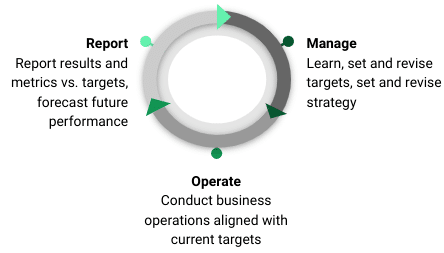Step #6: Learn Iterate & Improve in Business – Week #37 of The Financial Operating System®

The final step, “Step #6: LEARN, ITERATE, AND IMPROVE” in Chapter 22, focuses on adopting a continuous improvement mindset for managing a business effectively. It emphasizes the cyclical nature of running a business, where learning from experiences, making adjustments, and applying those learnings is critical for long-term success.
Key points include:
1. Business as a Circular Process:
- Running a business is not linear; it’s an ongoing loop of operations, reporting, and management.
- Each iteration provides opportunities to refine strategies, correct mistakes, and capitalize on successes.
2. Three-Phase Feedback Loop:
- Operate: Execute the business activities guided by goals, metrics, and standard operating procedures (SOPs). Encourage employees to provide feedback on what works and what doesn’t.
- Report: Generate financial and operational reports that go beyond historical data, focusing on actionable insights and forecasts.
- Manage: Evaluate reports, identify mistakes or opportunities, and make strategic adjustments based on data and feedback.
3. Mistakes as Learning Opportunities:
- Mistakes are inevitable and can be valuable if identified and addressed quickly.
- Systems, processes, and data-driven decisions help reduce the impact of errors and guide improvement.
4. Agility and Responsiveness:
- Highlighting Charles Darwin’s idea that adaptability is key to survival, the chapter encourages businesses to:
- Stay alert to market trends, competitor behavior, and internal inefficiencies.
- Use an Agile mindset to break goals into manageable pieces, solicit feedback, and improve iteratively.
5. Continuous Improvement:
- Business management is a never-ending process of learning and improving.
- Success depends on the willingness to evolve strategies, refine goals, and adapt to changing circumstances.
Takeaway:
Step #6 urges Learn Iterate & Improve in business owners to adopt a growth-oriented mindset, focusing on agility, data-driven decision-making, and iterative improvements. By operating, reporting, and managing with a commitment to learning, businesses can adapt to challenges and achieve sustainable growth.
Next Step:
Business owners can self-implement The Financial Operating System. Chapters are available to download at smartbooks.com/resources or you can buy the whole book from Amazon (the marketing firm version or the general business version).
If you would like assistance with implementation or would like to accelerate results for your business, please contact author Cal Wilder at cwilder@smartbooks.com or book a free consultation with our team directly using this calendar link.